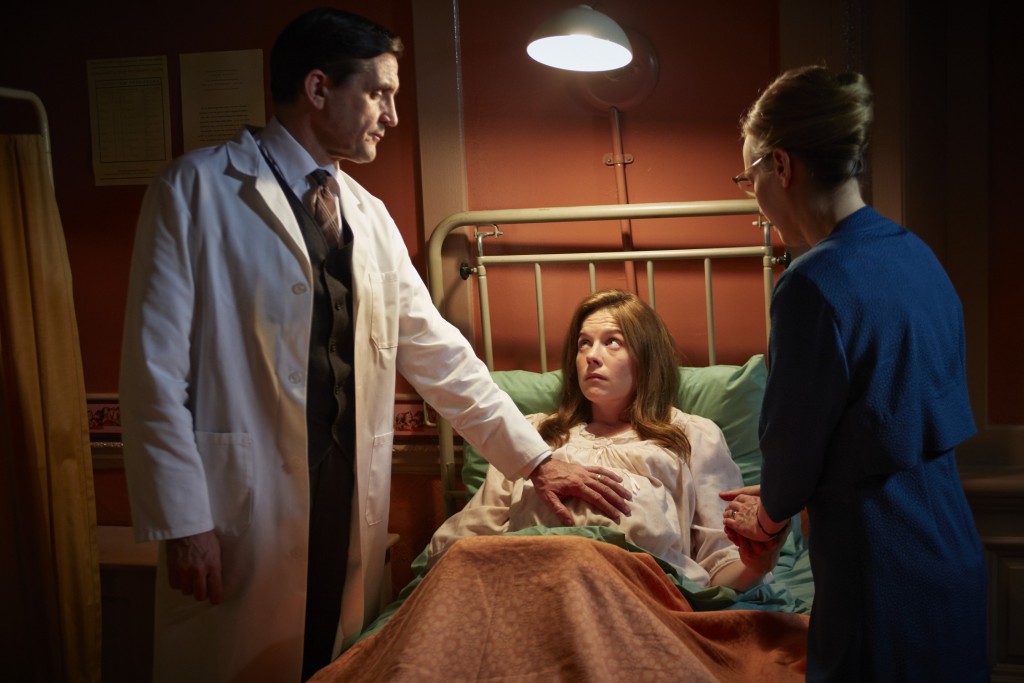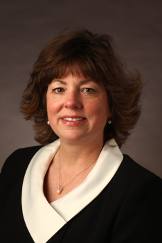For the fourth season in a row, we are honored to have the faculty of the Vanderbilt School of Nursing back to guest blog for us each Monday morning about the previous night’s episode of Call the Midwife, airing Sundays on NPT and PBS Stations nationwide at 7 p.m. CDT, March 29-May 17. Check in every Monday morning for historical and contemporary context on the show along with some fun discussion. SPOILER ALERT: Be aware that some posts may contain spoilers.

By Michelle Collins, Ph.D., CNM
 Season 4 of Call the Midwife started out with a bang with midwife Trixie (played by Helen George) catching a baby born in a taxicab. And yes, midwives prefer “catch” terminology rather than “deliver” (for more on that look up midwife Lauren Hunter’s excellent paper “Women give birth and pizzas are delivered: Language and western childbirth paradigms; citation below).
Season 4 of Call the Midwife started out with a bang with midwife Trixie (played by Helen George) catching a baby born in a taxicab. And yes, midwives prefer “catch” terminology rather than “deliver” (for more on that look up midwife Lauren Hunter’s excellent paper “Women give birth and pizzas are delivered: Language and western childbirth paradigms; citation below).
As the midwives discussed this unusual event (unusual because women gave birth at home, so babies were rarely born in transit to another location), you may have caught Sister Evangelina’s disparaging remark about the movement away from giving birth at home, and how that would inevitably lead to such occurrences. Between that and the storyline on formula vs. breastfeeding, I felt this episode highlighted well how the medical establishment has chipped away at the normalcy surrounding birth. There was a time, in our no so distant past, in which mothers were advised that formula feeding, compared to breastfeeding, was actually better for babies.
Typical parental guidance in the 1940s included:
• Putting babies on a rigid feeding schedule, rather than depending on baby’s hunger cues to allow them to lead feedings
• Minimizing any holding and/or snuggling of babies to avoid spoiling
• Making sure that baby’s environment was completely quiet while baby was feeding or sleeping (how did large families try and achieve that one??)
The most damaging advice in my opinion was to avoid picking up and consoling a crying baby (if you knew they were fed and had a clean diaper); to do so could result in (yet again) spoiled children. There was no recommendation at the time about babies sleeping in the same room with the parents, let alone (gasp!) safe co-sleeping.
Enter Dr. Benjamin Spock, American pediatrician who published his best-selling book on parenting, Baby and Child Care, in 1946. Dr. Spock was a revolutionary for his time (or an utter heretic depending on whom you asked!). Spock urged mothers to rely on their maternal intuition with his simple message: “You know more than you think you do.” Dr. Spock could have been an honorary midwife. By recognizing the normalcy of pregnancy and childbirth, and forging women and family centered relationships with our clients, we as midwives remind them constantly to trust their instincts and their intuition; mammas really do know best. When a woman is struggling with the initiation of breastfeeding, and the sometimes accompanying challenges, I love to reassure her with “you made this baby, nourished and grew him/her inside your body, and if that weren’t spectacular enough, you have everything you need to feed this little one.”
It saddens me to see women being robbed of this self-trust by a medicalized obstetrical culture that exists in the U.S. For those who falsely believe that the U.S. maternity care system results in the healthiest of pregnant women and babies, I urge you to check the facts. We are sorely lacking, yet we spend significantly more money on obstetrical care than other similarly sized industrialized countries. To pregnant women and new mommas I say, trust your instincts and question advice that “doesn’t sit quite right” with you. Ask for the evidence and have frank discussions. You absolutely do “know more than you think you do.”
Citation mentioned above: Hunter, L. P. (2006), Women Give Birth and Pizzas Are Delivered: Language and Western Childbirth Paradigms. Journal of Midwifery & Women’s Health, 51: 119–124. doi: 10.1016/j.jmwh.2005.11.009
Michelle Collins Ph.D., CNM, is an Associate Professor of Nursing, Director Nurse-Midwifery Program, at Vanderbilt University School of Nursing.